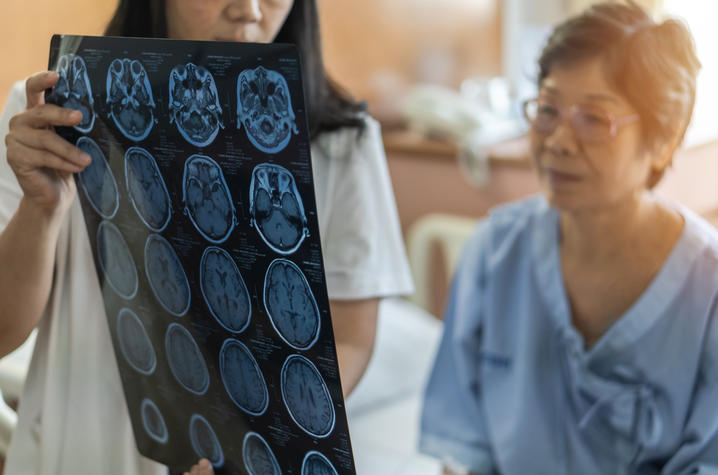The Effects of COVID-19 on the Nervous System

The University of Kentucky Public Relations & Strategic Communications Office provides a weekly health column available for use and reprint by news media. This week's column is by Dr. Larry Goldstein, chair of the Department of Neurology, Co-director of the Kentucky Neuroscience Institute, and Interim director of the UK-Norton Stroke Care Network.
LEXINGTON, Ky. (Nov. 9, 2020) — More than seven months have passed since the onset of the COVID-19 pandemic in the United States, and hundreds of reports have been published related to various aspects of the disease caused by the SARS-Co-V2. Despite knowing the virus’ genetic composition, its primary modes of transmission, and a growing understanding of the ways it can affect people who have the infection, there is much left to learn.
There are a host of possible direct and indirect effects of SARS-Co-V2 on the nervous system. One of the early symptoms of infection can be a loss of the sense of smell or taste. In fact, in at least one animal model, the virus can be traced spreading from the nose into the brain where it can affect respiratory centers, possibly contributing to some of the disease’s effects on breathing. Yet, there is only limited evidence of brain damage directly caused by the virus. Its impact on the nervous system may also be related to the infection’s effects on the immune system, blood clotting, and other consequences of severe illness.
Neurological effects, nonetheless, are common. One study of patients with COVID-19 found 42% had neurologic symptoms at disease onset and 82% had some neurological effects at some point during the disease, ranging from mild to severe. Whether a direct or indirect effect, some of the more common neurologic issues occurring during the acute infection include painful muscles, headache, dizziness and loss of smell or taste. Some of the more serious are impaired thinking or wakefulness, strokes, and seizures. There can also be longer-term consequences of COVID-19 including problems with memory and thinking, deficits related to stroke, and secondary diseases such as Guillain–Barré syndrome (rapid onset of muscle weakness caused by the immune system damaging the nerves in the legs, arms or even face). There, however, have been few high-quality long-term studies of patients who have had COVID-19 that would allow us to know how frequently these and other potential neurologic symptoms occur or last.
As in other areas of medicine, the best treatment is prevention. Wear an effective mask covering both the mouth and the nose, consider eye protection in closed spaces, wash hands frequently, and maintain social distancing.
As the state’s flagship, land-grant institution, the University of Kentucky exists to advance the Commonwealth. We do that by preparing the next generation of leaders — placing students at the heart of everything we do — and transforming the lives of Kentuckians through education, research and creative work, service and health care. We pride ourselves on being a catalyst for breakthroughs and a force for healing, a place where ingenuity unfolds. It's all made possible by our people — visionaries, disruptors and pioneers — who make up 200 academic programs, a $476.5 million research and development enterprise and a world-class medical center, all on one campus.
In 2022, UK was ranked by Forbes as one of the “Best Employers for New Grads” and named a “Diversity Champion” by INSIGHT into Diversity, a testament to our commitment to advance Kentucky and create a community of belonging for everyone. While our mission looks different in many ways than it did in 1865, the vision of service to our Commonwealth and the world remains the same. We are the University for Kentucky.




